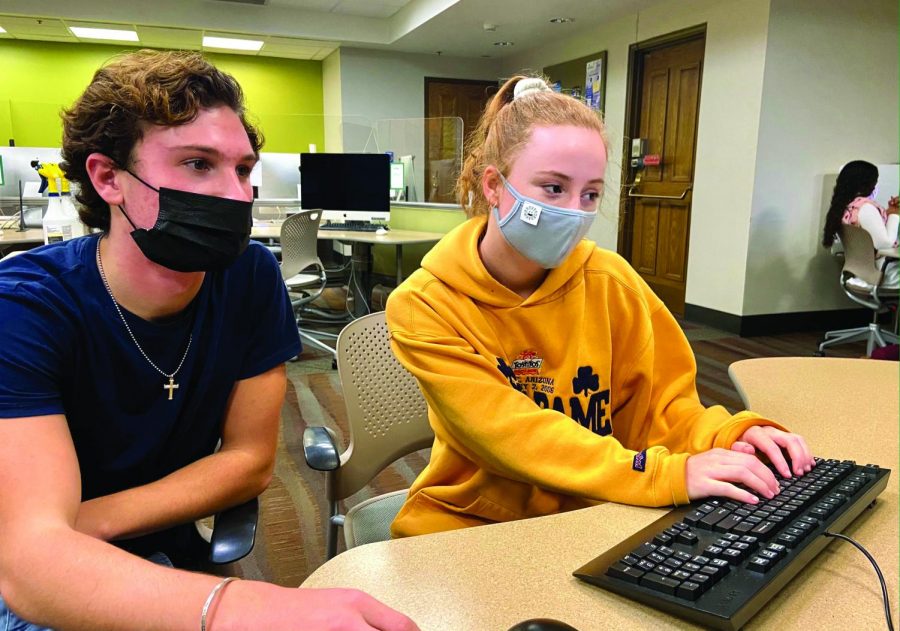Alumnae adapt to safety measures as they return to universities
College freshman, sophomores share returning to campus
Kristen Cirone
Cece Giarman (’19) adjusts to new safety protocols including wearing masks at the University of Notre Dame. Students attended in-person classes after undergoing a two-week quarantine upon arriving on campus in the fall.
October 26, 2020
Instead of reconnecting with peers and preparing for the new school year when she returned to the University of Notre Dame campus, Cece Giarman (’19) started off the semester sitting in a room quarantining for two weeks.
“Students flew from everywhere — even internationally — to get to the campus, so I wasn’t too surprised when the COVID-19 cases began to go up,” Giarman said. “Sitting in my room all day for 14 days straight was very emotionally exhausting, and being isolated from everyone definitely damaged my mental health.”
Giarman said that meals were delivered erratically and the university was disorganized and lacked resources in response to the pandemic.
“I remember I was starving because they only sent up one meal for two days and I couldn’t leave the hotel room,” Giarman said. “It was an overall awful experience, but I’m glad I didn’t get COVID-19 and that I am okay now.”
Giarman now attends in-person classes where students have to wear their masks and stay 6 feet apart. Masks are mandatory at all times unless students are eating or drinking or in their dorms.
“The administration has been really strict about masks which has helped me feel more comfortable about being around people,” Giarman said. “If someone breaks a rule by not following social distancing rules or throws a party, there will be disciplinary actions against them.”
Josie Rozelle (’19) also had to spend two weeks in isolation upon returning to campus at Colgate University in Hamilton, New York, but her experience quarantining at the college was different than Giarman’s.
“I had low expectations for the two-week quarantine period, but my expectations were exceeded,” Rozelle said. “The administration gave us a whole grocery bag of snacks to last us, so we always had something to eat even if the food that day wasn’t what we wanted.”
While living in isolation in Colgate’s dorms, students were tested for COVID-19 twice. Students who tested positive were sent to Wendt University Inn in Hamilton or returned home if within driving distance, whether they are symptomatic or not.
Students were not obligated to return in-person, and provisions were made to support remote learning and teaching for faculty, students and staff where necessary and possible, according to Colgate University’s reopening plan.
“Originally I wasn’t sure if I was going to come back to campus because the idea of taking two planes was really daunting, and I had already witnessed the shutdown of many other colleges,” Rozelle said. “Colgate’s plan for a two-week quarantine gave me more faith in the university and in the students, knowing that everyone would be following the same protocols.”
Much like individual states have adopted phased re-openings, Colgate is enacting a series of gates, similar to phases, which allow for greater social interactions and mobility as the semester progresses. Colgate is currently at gate two of three, which is considered the moderate restrictions level. Groups of 10 or fewer students may gather outdoors and groups of 20 or fewer may gather for professional staff-led activities, as long as they are wearing face coverings and staying 6 feet apart, according to Colgate University’s reopening plan.
“It’s definitely a different atmosphere on campus, many things I took for granted just aren’t the same anymore,” Rozelle said. “I’m sure this is extremely difficult for the freshmen who are experiencing college for the first time like this because it is definitely not normal.”
Freshman Lauren Barabee (’20) is adapting to the protocols at Kenyon College in Gambier, Ohio and despite some hardships, she is enjoying campus life more than she expected. With the strict regulations, such as students not being able to leave the county, Kenyon College has had no active COVID-19 cases.
“One thing that’s been hard about this whole experience is not being able to meet people as much as I would like and being in a single dorm,” Barabee said, “Other than that I am really happy with the way my college experience is going and know that the school is doing their best to give me the most normal experience I can get.”
Barabee is a swimmer at Kenyon and although at the beginning of the semester rules were strict, the college slowly lifted restrictions as the season progressed. Swimmers were initially allowed only one swimmer per lane, but has now expanded to two to three per lane.
“I think the way they eased into the season with COVID-19 precautions was very efficient and organized,” Barabee said. “I’m not too worried about the risks because we all get tested regularly, and are still being cautious in the water.”
Kenyon College has only half of its student body — freshmen and sophomores — on campus. The underclassmen will return home in the second semester, and take classes remotely while juniors and seniors learn on campus.
“It’s weird having only freshman and sophomores on campus but I’m getting used to it,” Barabee said. “I don’t want to go back home for my next semester, but I’m grateful for the fact that I got a pretty normal freshman year.”
Bella Shea (‘20) is adjusting to the new normal at the University of Michigan which has a more more moderate response having students on campus during the pandemic in comparison to other schools.
“We didn’t have to quarantine upon coming to campus, but students and faculty are required to wear masks all the time,” Shea said. “I’m grateful I’m on campus because it would be very difficult to get to know my class if I had been doing remote learning.”
The majority of classes at University of Michigan are online and students take them from their dorm rooms. Students took a do-it-yourself COVID-19 test before coming to campus and were expected to quarantine for 14 days at home before coming to campus in the fall.
“I feel like my school has taken a bit of a more relaxed approach to the pandemic than some other schools because we don’t do randomized testing or contact tracing,” Shea said. “I know that some of my friends going to colleges in California are doing fully remote learning from home, which must be very difficult.”
Freshman Sofia Telfer (’20) who is a student at University of California, Berkeley is experiencing a drastically different reality from Shea, because she is spending the entirety of her freshman year of college behind a computer screen.
“I feel that the school is making a big effort to try to go a little easy on students because learning in an online environment is harder than it would be in person,” Telfer said. “Socially it’s been a little hard because the majority of us aren’t on campus right now, but we are doing the best we can.”
UC Berkeley is planning for the spring semester to be very similar to that of the fall semester, according to a letter to the campus community by Chancellor Carol Christ. Students are not required to be present on campus or attend in-person classes for the second semester, and the majority of classes will be conducted fully online.
“I’ve been pretty bummed about the situation, but I’m lucky that once I get closer with people at UC Berkeley, I will be able meet people because it’s only a short drive,” Telfer said. “In the meantime, I am making friends through breakout rooms, and I organized a Zoom with some friends I made in my classes.”
According to Giarman, students are adapting to an abnormal way of life and are finding unique and safer ways to meet with new and old friends within their classes.
“I’m getting used to this new normal and connecting with classmates in a safe way has really improved my mental health,” Giarman said. “I know right now is a difficult time for everyone, especially college students but we will keep pushing through and get past this.”










